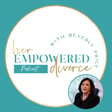
Are You Ready For Domestic Violence Court - Part 1 - with Larry and Joni Jones
There is a lot of trauma, shame, and mixed emotional response that comes with domestic violence, and emotional and legal readiness for court is paramount for domestic violence victims seeking justice and protection. Being ready to accept domestic violence, whether emotional or physical, as abuse is key to confronting trauma, guilt, shame, and anxiety associated with court proceedings. In this episode of Her Empowered Divorce, your Host, Beverly Price, talks to Joni Jones and Lawrence Jones, experts on both the emotional and legal aspects of domestic violence. Together, they discuss the emotional readiness of domestic violence victims for court to provide you with the tools you need to emotionally and legally advocate for yourself and get the protection and justice you deserve. Do not condone domestic violence by your silence.
Divorce doesn’t have to be a death sentence. With the right support and guidance, you can move through the process with knowledge, skills, and confidence. If you’d like to schedule a complimentary private consultation, reach out to Beverly at: https://beverly-price.as.me/Consultation.
Visit https://podcasts.apple.com/us/podcast/her-empowered-divorce/id1635143315 to access the entire archive of Her Empowered Divorce episodes, and while you’re there, please subscribe, rate, and review our show!
KEY TAKEAWAYS:
- Why didn’t you just leave if you were being abused? This question often demonstrates a real misunderstanding of domestic violence; people are not always in a position to leave.
- The gaslighting effect is very prominent in domestic violence, and often, things don’t get better even when we stay hoping they would; these situations don’t fix themselves and often escalate into a cycle of domestic violence.
- The top form of domestic violence is not physical or assault; it is harassment. You can be abused without being laid a hand on, such as through threats, cyber harassment, or posting embarrassing things online. This is far more traumatizing than physical.
- Whether the domestic violence is physical or emotional, emotional readiness is recognizing and accepting it as abuse without making excuses for chronically abusive behaviors by an abusive partner.
NOTABLE QUOTES:
- Everybody has individual emotional responses, but there are so many mixed emotions when you’re going through domestic violence. You can feel confused, lost, and anxious, which can be stifling and traumatizing. (Joni)
- Victims of domestic violence are not always in a position to leave because there could be children involved, financial dependency, fear, and emotional shame. There could be legitimate reasons why somebody stays in an abusive relationship even when they know it’s unhealthy for them. (Lawrence)
- Sometimes, when victims of domestic violence stay and hope things will get better, the other side can use that against them in court with the myth that “If I were a bad person, they would have walked out” to justify themselves. (Lawrence)
- If you are a product of domestic violence as a child, you could adopt that as the norm because that is what you have been shown and grown up in. (Joni)
- A lot of people feel like they are staying in a relationship for their children because they think they are providing stability for the children, but often, they also end up being victimized. (Joni)
- Children, even if they are not the target of domestic violence, just growing up seeing parenting domestic violence heightens the risk of becoming victims or abusers themselves. (Lawrence)
FURTHER RESOU
